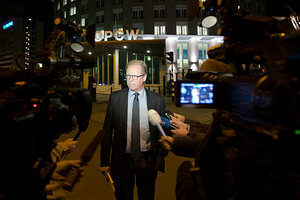OPCW: Will Nobel Peace Prize help wipe out chemical weapons?
The announcement that the OPCW had won the Nobel Peace Prize gave many hope that the world will move closer toward that goal.

Spokesman Michael Luhan gives a brief statement outside the headquarters of the Organization for the Prohibition of Chemical Weapons (OPCW) in The Hague, Netherlands, Sept. 27, 2013. The OPCW were awarded the Nobel Peace Prize on Friday, Oct. 11, 2013.
Peter Dejong/AP
Beirut, Lebanon
In the 16 years since its creation, the Organization for the Prohibition of Chemical Weapons has been quietly going about its work, cataloging and destroying chemical weapons arsenals around the world.
The Netherlands-based weapons watchdog shot to prominence last month when it was tasked with removing Syria’s stockpile by July 2014. With Friday’s announcement that the agency had won the 2013 Nobel Peace Prize, many hope the award will help bring closer the goal of unanimous global participation in the Chemical Weapons Convention, and the worldwide eradication of poison gas stockpiles.
“The conventions and the work of the OPCW have defined the use of chemical weapons as a taboo under international law,” said Thorbjoern Jagland, the head of the Nobel Peace Prize committee, in announcing the award. “Recent events in Syria, where chemical weapons have again been put to use, have underlined the need to enhance the efforts to do away with such weapons.”
“We were aware that our work silently but surely was contributing to peace in the world,” organization chief Ahmet Uzumcu said Friday in a statement. “The last few weeks have brought this to the fore. The entire international community has been made aware of our work.”
When Syria formally joins the treaty on Monday, it will become the 190th member state, leaving just six other countries that either have not ratified the convention (Israel and Myanmar) or not joined it at all (Angola, Egypt, North Korea, and South Sudan).
“The fact that Syria has joined the Chemical Weapons Convention is a major development because probably the most difficult area to complete what we call the universality of the convention is in the Middle East,” Michael Luhan, the OPCW spokesman, said in a recent interview with the Monitor.
The decision by other regional countries whether to join the CWC “was really held hostage to the [Iranian and Israeli] nuclear issue and larger issues of regional security,” he says.
“And now Syria has broken that by joining, so we’re hoping that will create some momentum and we can get at least one more of those countries into the convention,” Mr. Luhan says.
Despite having destroyed 81 percent of the world’s declared chemical weapons arsenal as of the end of September, the OPCW’s efforts have generally been unrecognized.
The OPCW has a staff of around 500 people and is based in The Hague.
So far, seven of the 189 signatory countries have undergone, or are still undergoing, OPCW-monitored programs to destroy their chemical weapons – Albania, India, Iraq, South Korea, Russia, the United States, and Libya. States are required to disclose their full chemical weapons arsenal, and the OPCW does not have the latitude to conduct investigations if it harbors suspicions that a member state could be concealing additional chemical weapons.
Of the seven, Albania, India, and South Korea have had their chemical stockpiles completely eradicated. The US and Russia had the world’s largest arsenals, with a combined declared total of 75,600 tons, of which 90 percent of the US stockpile and 69 percent of the Russian inventory have been destroyed.
The fate of the estimated 1,000 tons of chemical weapons in Syria long has troubled the US and other Western countries, which feared that the deadly nerve agents could end up in the hands of militants.
OPCW’s mission in Syria arose following a sarin gas attack in a Damascus suburb on August 21 that is believed to have killed over 1,000 people. With the regime of Syrian President Bashar al-Assad widely blamed for the attack, the US and Russia reached agreement that forestalled a punitive campaign of US missile strikes in exchange for the Assad regime turning over its chemical weapons stockpile to international inspectors.
The OPCW began destroying components of the chemical weapons arsenal last Sunday. It has until the end of the month to verify the accuracy of Syria’s chemical arsenal inventory and demolish the four known production facilities. The entire stockpile is scheduled to be destroyed by July 1, 2014.
On Friday, organization inspectors continued their work in Syria, visiting further facilities. Underlining the potential dangers, Syrian aircraft reportedly bombed rebel-held areas Friday in the northern town of Safira beside a sprawling military base that is believed to be one of the four suspected chemical weapons production facilities. The base, which includes underground bunkers, has been under threat of being seized by rebel forces for several months.
The air raid on Safira was reportedly an attempt by the Assad regime to regain full control of the area. The Safira chemical weapons site will be one of the facilities that the OPCW inspectors are required to visit before the end of the month.

